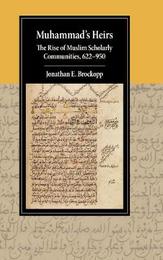
|
Muhammad's Heirs: The Rise of Muslim Scholarly Communities, 622-950
Hardback
Main Details
| Title |
Muhammad's Heirs: The Rise of Muslim Scholarly Communities, 622-950
|
| Authors and Contributors |
By (author) Jonathan E. Brockopp
|
| Series | Cambridge Studies in Islamic Civilization |
|---|
| Physical Properties |
| Format:Hardback | | Pages:248 | | Dimensions(mm): Height 235,Width 158 |
|
| ISBN/Barcode |
9781107106666
|
| Classifications | Dewey:297.6109021 |
|---|
| Audience | | Professional & Vocational | |
|---|
| Illustrations |
17 Halftones, black and white
|
|
Publishing Details |
| Publisher |
Cambridge University Press
|
| Imprint |
Cambridge University Press
|
| Publication Date |
10 August 2017 |
| Publication Country |
United Kingdom
|
Description
Muslim scholars are a vital part of Islam, and are sometimes considered 'heirs to the prophets', continuing Muhammad's work of establishing Islam in the centuries after his death. But this was not always the case: indeed, Muslims survived the turmoil of their first century largely without the help of scholars. In this book, Jonathan Brockopp seeks to determine the nature of Muslim scholarly communities and to account for their emergence from the very beginning of the Muslim story until the mid-tenth century. By analysing coins, papyri and Arabic literary manuscripts from the ancient mosque-library of Kairouan, Tunisia, Brockopp offers a new interpretation of Muslim scholars' rise to positions of power and influence, serving as moral guides and the chief arbiters of Muslim tradition. This book will be of great benefit to scholars of comparative religion and advanced students in Middle Eastern history, Islamic Studies, Islamic Law and early Islamic literature.
Author Biography
Jonathan E. Brockopp is an Associate Professor of History and Religious Studies at Pennsylvania State University. He is the editor of and contributor to The Cambridge Companion to Muhammad (Cambridge, 2010).
Reviews'Jonathan Brockopp is an extraordinary scholar and Muhammad's Heirs is an extraordinary work of scholarship. It helps us to better understand the early development of Islam, and the key relationships between Muslims, Jews and Christians in that development.' Amir Hussain, Department of Theological Studies, Loyola Marymount University
|